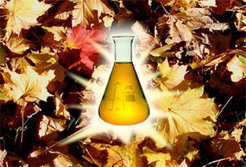Researcher of the Max Planck Institute of Colloids and Interfaces receives highly remunerated ERC Advanced Grant
The colloid chemist Markus Antonietti receives prestigious EU funding for pioneering frontier research project in the area of sustainable chemistry
The research project „HYDRA-Chem”, which is awarded with 2.5 million EUR, deals with the fundamental questions of matter and energy management. Innovative transformations under hydrothermal and ionothermal conditions are supposed to produce matter and materials, which are able to reduce the CO2 emissions of the atmosphere. By this means fossil fuels should be replaced in large, technical areas. Markus Antonietti is one of the few German researchers, who receive this European award in the area of the exact natural sciences.

The interdisciplinary research project combines important scientific challenges with innovative concepts, which go beyond recent science or technology. Raw biomass or agricultural side products are treated in water under high pressure and temperature. By adding proper catalysts these materials can be transformed into various products. “We only try to repeat under optimal lab conditions what nature does when it is creating coal, oil or gas all alone” says Antonietti. “The chemistry of processes in water and salt melts is still a scientific wasteland. There are pioneer experiments which are partly 100 years old, but were forgotten with the emergence of the oil industry. By using innovative catalytic systems, as the Berlin excellence initiative UNICAT does, we know today some of the possibilities how to prepare ourselves for the forthcoming chemistry after the oil era".
Markus Antonietti is now 48 years old, since 1993 director of the Max Planck Institute of Colloids and Interfaces and Professor at the University Potsdam. He is one of the most cited German chemists and material scientists and has received numerous international prices and awards. Furthermore he is a member of the Berlin Brandenburg Academy of Sciences and of the Berlin Brandenburg excellence cluster „UNICAT“. The ERC Advanced Grant will allow him to pursue ground-breaking, high-risk research that can open new directions in chemistry.
ERC Advanced Grant
ERC Advanced Grants allow exceptional established research leaders in any field of science, engineering and scholarship to pursue frontier research of their choice. They aim to encourage risk-taking and interdisciplinarity, and supports pioneering frontier research projects. Depending on the nature of the proposed research, which must be carried out in any EU Member State or associated country, it may be supported with up to € 3.5 M for a period of up to 5 years. The European Research Council (ERC) has received 2,167 applications for its Advanced Grants. These included 997 in physical sciences and engineering, 766 proposals in the area of life sciences and medicine, and 404 proposals for social sciences and humanities research.












